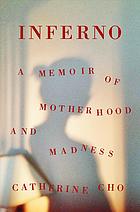
Inferno
A Memoir of Motherhood and Madness
یه Memoir مادری و دیوانگی
کتاب های مرتبط
- اطلاعات
- نقد و بررسی
- دیدگاه کاربران
نقد و بررسی

Starred review from April 13, 2020
In an eerie, unsettling debut memoir about postpartum psychosis, Cho delves into her 2018 breakdown after the birth of her son, Cato. Cho started showing signs of distress when she and her husband, James, traveled from their home in London to visit James’s parents in New Jersey and threw Cato a traditional Korean party to mark his 100 days of life. As James’s overbearing parents questioned Cho about Cato (“Why wasn’t he rolling yet?”), Cho began losing her grip: she started suspecting she was under surveillance, her son suddenly appeared to have “flashing red pupils,” and she heard voices telling her, “Your son needs to die.” Soon, Cho was involuntarily committed to a psych ward by doctors, where she bobbed in and out of lucidity, tore at her clothes, and saw demons during her 12 days there. The author spends little time on the science behind postpartum psychosis (“the reasons for postpartum psychosis aren’t fully understood”), and punctuates her story with discussions of Korean culture and the pressure Korean families place on mothers and wives to be accommodating; her narrative culminates with Cho getting medicated, then tentatively reestablishing a physical bond with her son and accepting him as her own (“I remembered him... I was a mother again”). This piercing narrative about motherhood and a fraying human mind will slowly and creepily pull the reader in and leave a chill.

June 1, 2020
A publishing professional makes her writing debut with a memoir that details her experiences with postpartum psychosis. As Cho notes, she and her husband, James, were two Korean Americans who never paid "attention to Korean traditions," but as they planned for a trip across the U.S. to show off their infant son to friends and relatives, "the rules [of their culture]," which included a "hundred-day celebration" for their baby, suddenly mattered. Then, a week before the event, Cho experienced a harrowing break with reality. Not only did the author believe she was Dante's Beatrice, responsible for leading her husband out of hell; she also believed her baby son had "devils' eyes." James took her to a psychiatric hospital. In the dream state of madness, she felt "removed from time," and memories from childhood and adolescence intermingled with the present. It was as though she was caught in "an infinite loop" in which events, including a past abusive relationship, happened "again and again but with slight variations." Cho's sense of self fractured to the point where she could not recognize the faces of members of her husband's family in pictures. At the same time, the psychosis also seemed to bring her closer to the ancestors who fled North Korea at the beginning of the Korean War and sacrificed connections to loved ones they would never see again. Thinking of them, the author remarks that her experiences "felt so familiar, pre-written somehow," as if the psychosis somehow replayed a kind of epigenetic trauma. Cho also candidly describes the depression that gripped her in the months following her break. "I wondered if [my son] could sense it," she writes, "this stranger who had taken his mother's place." Haunting and emotionally intense, this powerful memoir explores the hidden connections that tie families across generations, offering poignant meditations on the meaning of motherhood and identity. A compelling look at a mysterious mental illness.
COPYRIGHT(2020) Kirkus Reviews, ALL RIGHTS RESERVED.

August 28, 2020
In novels such as Margaret Atwood's The Handmaid's Tale, depictions of women separated from their children and confined as "mad" should provide a metonym for living with issues such as postpartum psychosis. Yet as Cho clearly illustrates in this debut, these fictions cannot be disentangled from facts. For women who experience barriers (cultural, linguistic, socioeconomic, etc.), maternal care cannot rightly be called such and, in fact, these obstacles often result in high mortality rates for mothers and their babies alike. With lyrical and often discomforting writing, Cho boldly recounts her involuntary hospitalization following the birth of her son. Her recollections also shed insight into the inequities of maternal care in the Unites States and the stigma of mental illness, especially among people of color, intertwining those thoughts with ones on motherhood in general. The most affecting passages are ones in which Cho tries to recall memories of husband and son while recovering in the ward and, later, trying to adjust to her identity as a mother. "I was a mother. I was still trying to figure out what that meant." VERDICT A candid memoir that reminds readers how much work we need to do to ensure that maternal care and mental illness are divested of stigma.--Emily Bowles, Lawrence Univ., WI
Copyright 2020 Library Journal, LLC Used with permission.

























دیدگاه کاربران